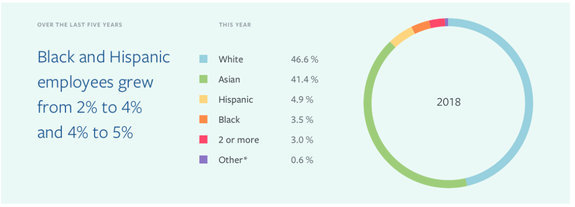Facebook's latest diversity report is as underwhelming as ever

Surprise, surprise: Facebook is still overwhelmingly white and male.
That's the bottom line of Facebook's fifth annual diversity report, which was released Thursday. And while the company may still have a race and gender issue, the report does show slight increases in the number of employees who are women and people of color.
SEE ALSO: Making tech truly diverse calls for new tactics and renewed commitment
Globally, the number of women employees grew from 35 percent to 36 percent and the number of women in senior leadership positions rose from 28 percent to 30 percent. The number of black employees grew only slightly from 3 percent in 2017 to 4 percent, and the number of Hispanic remained unchanged at 5 percent. Facebook employees are still overwhelmingly white (46.6 percent globally) and Asian (41.4 percent globally).

Image: Facebook
Even with the increases, the number of black and Hispanic employees in technical roles (1 percent and 3 percent, respectively) and senior leadership positions (2 percent and 3 percent) remained unchanged over the last five years. In fact, the number of black employees in senior leadership positions actually declined slightly compared with 2017, from 3 percent to to 2 percent.
Notably, the report makes no mention of Facebook's board, which is also overwhelmingly white and male, though COO Sheryl Sandberg promised earlier this year to seek out more diverse candidates for board positions.
Looking to the future, Facebook's chief diversity officer Maxine Williams said the company plans to work more closely with historically black and Hispanic colleges.
"We’ve learned through trial and error that if we’re going to hire more people from a broader range of backgrounds, it’s not enough to simply show up at colleges and universities," Williams wrote in a blog post. "We need to create practical training opportunities for these students to build on their academic experience."
She also noted that "diversity isn’t only about gender, race, and ethnicity," and that the number of U.S. employees who identify as LGBTQ has increased from 7 percent to 8 percent.
WATCH: This 'Accidental Icon' is using her teaching background to implement social change in the fashion industry


 Yahoo Finance
Yahoo Finance 